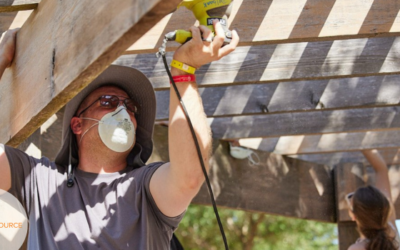Download the leader guide for the study here.
Before You StartIt can be helpful as a leader to understand the bigger picture of where this study is headed. This helps you to lead with more confidence. Let’s start by answering some key questions.
Why the Exodus?
The Exodus of God’s people from Egypt is considered to be the major salvific moment in the Old Testament. It’s brought up again and again in the Prophets. In the Exodus, we also see God’s people endure many things. They endure slavery, having to trust God, and being tested by God. They endure both the physical elements of the desert and the consequences of their sinful nature.
We also see God continue to be faithful to His people in the Exodus. He constantly fights for and provides for them even when they turn away from Him. He helps them endure the hardships they face, saves them time and time again, and leads them to the Promised Land. From this, we can move to how God continues to fight and provide for us, even when we aren’t faithful to Him. He also invites us to walk His paths and stand firm in His promises and faithfulness.
Why “Sit, Walk, Stand?”
The terms “Sit,” “Walk,” and “Stand” are taken from a series of sermons (compiled into a book titled Sit, Walk, Stand) by Watchman Nee. They are tweaked slightly to fit this study and the theme “Endure.” Each term is explained through the course of the series. But here are the details for you as you prepare:
- Sitting is trusting in God’s promise to fight and provide for us. Sitting is a totally passive endeavor; It is simply receiving God’s good gifts given to us out of His generous love. Enduring starts with sitting, which is the opposite of what we tend to think.
We usually think of us having to do something when we endure. For Christians, enduring is only possible in and through Christ – He’s already done all the work for us. So, we sit with God in prayer and His Word.
As you’ll see in the first study, sitting is “first position” for human creatures. Adam & Eve’s first day was creation’s seventh, and the day God rested. Mankind’s first day of life was a day of sitting and resting in God’s good gifts and promises. In God’s Word we see that mankind is constantly invited and called by God to sit and trust that He will fight and provide for His people when they come up against adversity of all types.
- Walking is trusting that God’s ways are good and then walking them. Often, we think of enduring as our action. But we see in God’s Word that when we walk – when we do things – the only right way to do them is God’s way. Unfortunately, we don’t always believe this. We, like the Sons of Israel, would rather walk our own paths – either because we think they are better or because we think God’s paths are too hard.
When we endure, we start with sitting and trusting God, but are then called to walk with Him, continuing to trust Him to provide, but also trusting that His ways are best and going to help us endure to the end.
- Standing is standing firm in the promises of God revealed to us when we sit. We do not stand on our own foundation. We stand in the foundation that God is generous and loving, keeps His promises, and fought and provided for us in the life, death, and resurrection of Jesus.
This is not a step by step process or method we follow. We DO always “start” with sitting. However, we don’t always walk then stand. Sometimes we sit, then stand, then walk. If anything, we sit, walk or stand, and then sit again. We get tired when we walk and stand, which brings us right back to sitting in and with God, who gives us rest.
Series Sessions
Session One: Sitting – The Red Sea
Session Two: Bread from Heaven and Walking
Session Three: 10 Commandments and the Golden Calf – Walking Leads to Sitting
Session Four: Spies to Canna and the Death of Moses – Standing
The Structure of Each Study
- The first three studies follow the same general outline:
- Some introductory questions
- An activity (The final study does not have an activity)
- Bible Readings and Discussion Questions.
- The activities in Studies 2 & 3 are challenge activities. There is some potential for injury or an opportunity for participants and leaders to become unnecessarily mean. Make sure you read through the activities in the study and have plans for how to encourage participants and keep them safe.
- Overall, you’re highly encouraged to read through each study a few days and multiple times before doing them with your group. It might be helpful to have Bible readings printed out for participants if you don’t have Bibles on hand. These studies were written with the ESV and NIV translations.
- Scripted text for adult leaders is in orange. Feel free to adapt these leader notes to better fit how you talk. Young people cherish authenticity, so it might be wise to not read what is written from the page in front of them in real time. However, they are there to help those who may not feel comfortable leading Bible study or may not have much experience doing so.
Download the leader guide for the study here.
There are four devotions which go alongside this study, the devotions will be linked below when they are posted.







0 Comments